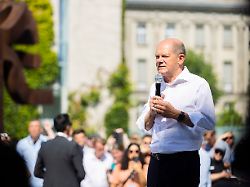Appeal to coalition partners
Scholz calls for speed with basic child security
08/20/2023, 5:13 p.m
Only “details” are still unclear, but basic child security will soon be passed, says Green leader Nouripour. Chancellor Scholz is also losing patience. Despite the dispute between the Liberals and the Greens, the law will “succeed quickly,” he says.
Chancellor Olaf Scholz has criticized the public dispute between the coalition partners FDP and the Greens over basic child security. The law is still in the works, “so I’m not happy that it’s already been publicly discussed,” said Scholz at the federal government’s open day in Berlin. The conclusion of the law will now “succeed quickly”.
The basic child security is intended to summarize previous family policy benefits and simplify the procedure for obtaining them. The corresponding plans of family minister Lisa Paus have been the subject of controversy for weeks. Federal Minister of Finance Christian Lindner sees them critically. The dispute escalated this week, and on Wednesday Paus stopped Lindner’s draft law for the Growth Opportunities Act, which provides tax breaks for companies. FDP representatives in particular criticized this severely and at the same time reiterated their substantive criticism of basic child security.
However, this dispute does not change the fact that “we are making all the important decisions bit by bit so that our country has a good future,” Scholz asserted, adding with regard to representatives of the coalition parties: “And maybe one or the other will then get used to it remember not to talk until you have reached an understanding,” said Scholz.
Draft law envisages costs of 3.5 billion
Meanwhile, the Greens and the FDP continue to debate. The federal government has not yet reached an agreement on Paus’ draft law on basic child security. Both the government spokesman and the spokesman for the finance and family ministries referred to ongoing internal government coordination. They did not want to confirm that Paus expects costs of 3.5 billion euros for 2025 in their draft law.
The spokesman for Finance Minister Christian Lindner pointed out that two billion euros were planned in the medium-term financial plan. This amount should be used in particular to ease the access requirements for the services. The main aim of the reform is to increase the use of funds from the child allowance of 250 euros introduced on January 1, 2023. So far, only around 35 percent of those entitled to apply for a child allowance.
Scholz had asked Paus before the summer break to present calculation variants for the basic child security planned by the traffic light. The family minister originally called for additional funds of up to twelve billion euros, but a few days ago she spoke of costs of between two and seven billion euros. The costs depend to a large extent on how many people will actually claim the child supplement. “Die Zeit” recently reported that the bill envisages costs of 3.5 billion euros in 2025. The dispute should be clarified at the cabinet meeting at the end of August in Meseberg at the latest. Green leader Omid Omid Nouripour said in the “Bild am Sonntag” that there was no blockade and that there were still “a few details” to be clarified.
Lindner wants a substantive debate
Federal Finance Minister Christian Lindner now wants to discuss the content of basic child security. Families who have immigrated to Germany since 2015 are particularly affected by child poverty, said the FDP politician at the open day in his ministry in Berlin. He would like to discuss how these children and young people can best be helped.
“Is the best way to help them by transferring more money to their parents’ accounts?” asked Lindner. “Or isn’t it at least worthy of discussion to invest in language support, integration, the employability of parents and to equip the day-care centers and schools for the children in such a way that they can perhaps catch up on what the parents can’t do?” It is precisely this debate that the traffic light government will lead, Lindner announced.
According to the Federal Agency for Civic Education However, almost two million children in Germany were already living on Hartz IV in 2015. This was almost 15 percent of all children under the age of 18. Above all, children of single parents or those who grow up in families with many children are particularly affected by poverty.
